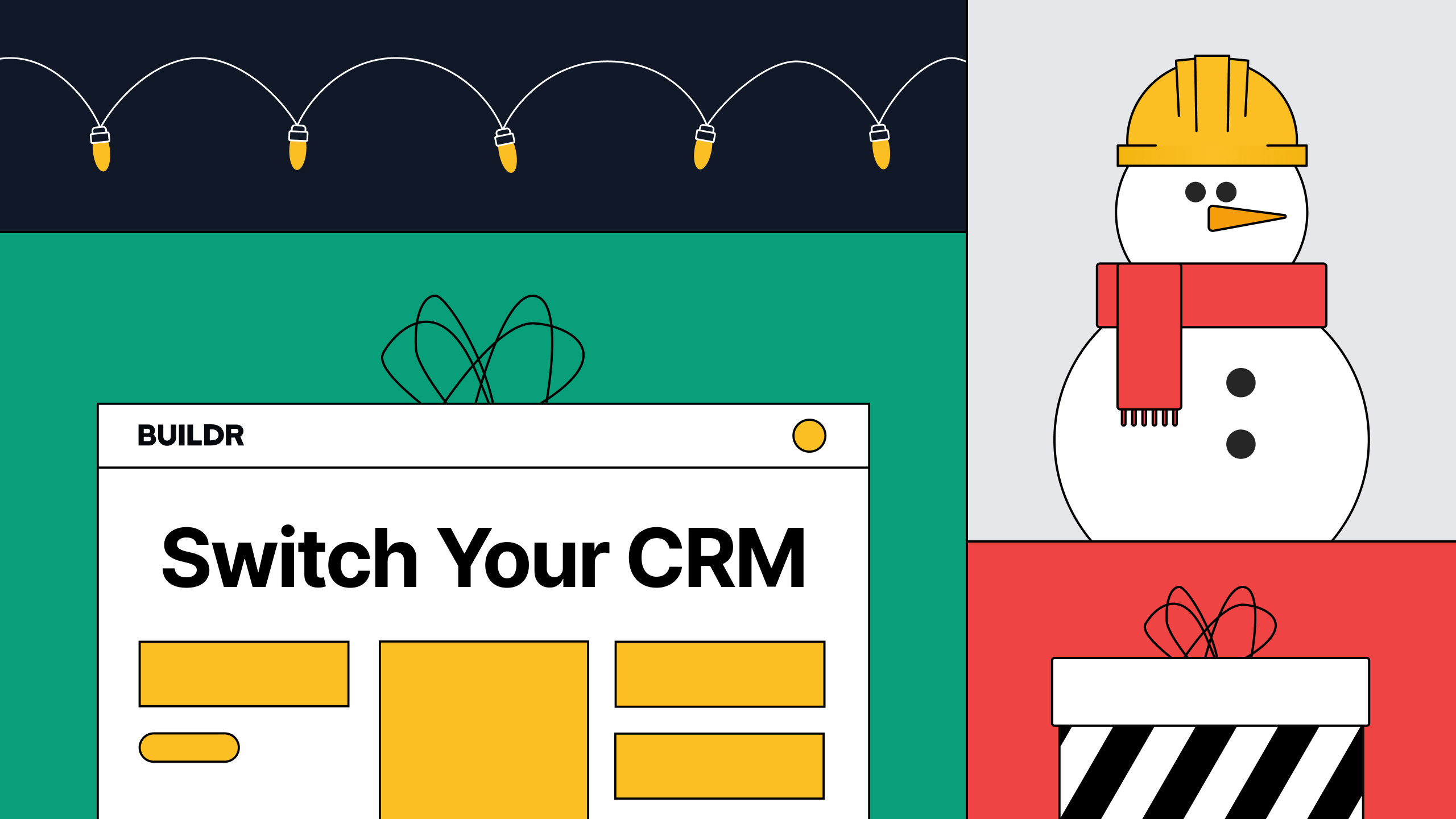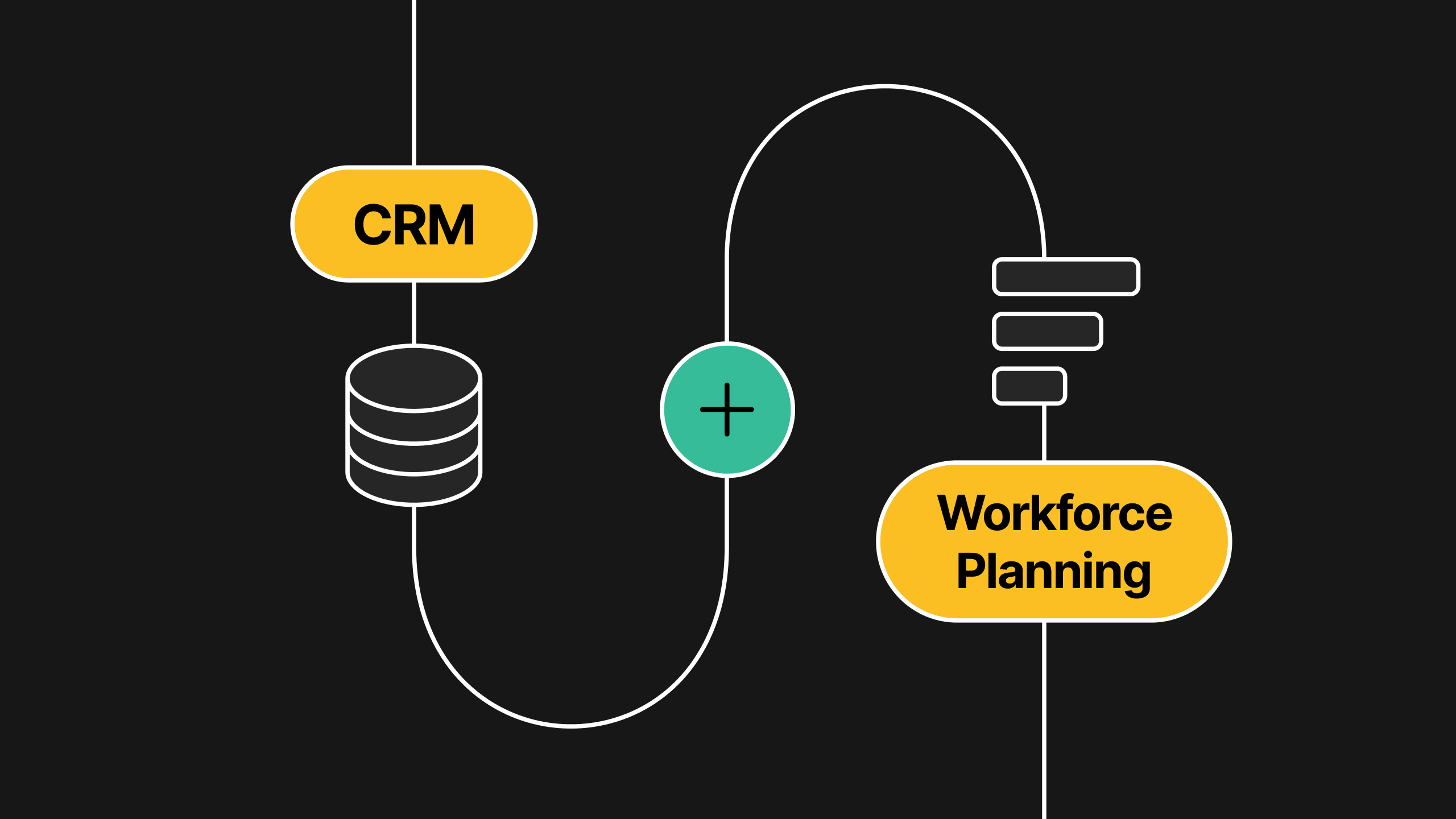
Why the New Year is the Best Time to Switch CRMs
A better process is the gift that'll keep on giving
December 4, 2023
9 min read
CRM

Michael Sullivan
Senior Growth Marketer

Implementing a new software can seem like it would be difficult. But if you’re not getting value out of your existing solution that you outgrew a few years ago, you’re opting to live in a state of perpetual difficulty.
Sunk-cost fallacy is the phenomenon when you're reluctant to abandon a strategy because you've invested heavily in it, even when it’s clear that abandonment would be more beneficial. In construction, sunk-cost fallacy is less a phenomenon than the norm for a myriad of reasons.
The rationalization of sticking with "legacy" softwares and processes usually boils down to:
“Construction is complicated and time-consuming. There’s not enough time to think about changing softwares or upending processes that we’ve had in place for years.”
This hypothetical quote-sayer is so close to getting the point. It’s the very fact that construction is so complicated and time is in such short supply that having a good construction-specific CRM is critical to thriving. The goal is thriving, not just surviving.
Why does a construction CRM matter?
As a refresher, a construction CRM is a software that allows general contractors to stay on top of maintaining their client base, track revenue goals, and assign the best workforces, all while keeping everyone on their team in the loop through increased visibility and collaboration.
Only when builders optimize their business development process—and automate the tedious administrative tasks that can be automated—can they focus fully on what they do best: building.
To put it simply: when a general contractor truly hones in their preconstruction process, it unleashes their full potential as a high-performer in their market. A good CRM with reporting and forecasting visibility empowers a GC to make better business decisions.
Of course, customer relationship management is a year-round discipline in construction. As such, there’s no great time to take a breath and switch CRM softwares. Right?!
Wrong. The perfect time is actually now. As in, right this second. Hurry—schedule a demo of Buildr!
Or you can, you know, read on if you'd like some more convincing.
How do I know if we should change our CRM?
Before we get into the reasons why it's best to change, it’d be best to evaluate if there’s even a need for a change in the first place.
As a reminder, a well-utilized CRM looks like:
A platform everyone knows how to use and can collaborate on
Client and project data that stays up-to-date and flush across all departments
Cross-departmental transparency that eliminates following up or setting “catch-up” meetings
Ease in frustration from informational clutter
Security in knowing your forecasted revenue months and years out
Competitive advantage from putting your best people on the right jobs through integrated workforce planning
Construction specificity—a platform that’s built for your workflow without making sacrifices to get a square peg in a round hole
If you’re missing checks on any of these boxes, it may be time to start looking for greener CRM pastures. If your CRM has more features than you know what to do with—or worse, not enough features—it may be time to throw a few CRM demos on your calendar. If your CRM’s support team isn’t the most helpful and they charge you every time you want to add a custom field, well, you get the point.
General contractors that are forcing their CRM to fit their workflow are straining themselves unnecessarily. Overall profitability to the company takes a hit, that much is certain, but the effort it takes to try to make a “legacy” system work is energy that could be better placed elsewhere.
Your CRM should click right into place within your preconstruction engine. It should feel weightless—you shouldn’t even have to think about it, let alone think about what you could do to improve it.
In a poll, 86.5% of respondents said user-friendliness was their most important factor when evaluating new CRMs. Would you call your current CRM user-friendly?
Create an anonymous poll and see how everyone is enjoying your current CRM. If you already know they’ll give your system a less-than-glowing review, there’s your answer.
For a more empirical way to evaluate your need for a new CRM, check out your user activity reports. Are most people actually using it, or is most of the activity tied to a single user? Poor usage is not a symptom of a lazy team but of a cumbersome product.
Consider your ROI of your current CRM. Mint Construction doubled their annual construction volume without having to hire anyone else, simply because they had a CRM that gave them clarity and unleashed their ability to make sharper business decisions. Talk about recouped investment.

Why the New Year is the best time for general contractors to switch their CRM
Winter is the slowest season in construction
Construction and client relationship management are year-round, yes. There’s no perfect time to switch CRMs, sure. But the closest-to-perfect time to switch is without a doubt wintertime for the fact that (drumroll) it’s cold. And coldness has a pretty massive effect on things.
April to October in most states is primetime for construction. Summer is universally the most active month in construction. When things are “all hands on deck,” it puts a strain on adopting new technologies for the less proactive and less organized firms that can't dedicate resources to adopting new tech.
Winter is conversely the “slow season” for construction. Depending on which state you’re in, projects can either slow or completely shut down starting in December due to inclement weather. Weather aside, construction is all but put on pause in the latter half of December due to the holidays, with things starting to ramp up again in early January.
Construction’s natural slowdown in December provides a much-needed pause for evaluation and transition if need be. What better time for a CRM glow up?
Buildr's data transfer and onboarding has never been more seamless
Many times, general contractors won’t consider swapping CRMs because of the perceived effort and expense of transferring over all their client and project data and then teaching everybody on their team a brand new software.
At Buildr, we understand that most general contractors will have this exact fear. This is why we’ve spent so much time fine-tuning our data transfer process down to a science. Are you coming from spreadsheets? We’ve got you. Are you coming from another CRM? No problem. Best of all, implementation costs are slashed this holiday season.
As far as "teaching everybody a brand new software," your implementation manager's job is to make sure that everyone on your team feels comfortable inside the platform. We want you to succeed as much as you do.
Buildr's clean user interface was designed as a foil to the complicated, cluttered construction CRMs that saturate the market. As a result, people pick it up very quickly. One of our self-proclaimed "non-tech-savvy" clients said they learned the ins and outs of Buildr the very first day they played around in it.
We’ve heard way too many horror stories of CRM implementations taking months, years, or at worst, never completing at all. Buildr takes 3-4 weeks for companies of any size to get fully onboarded. We offer unlimited seats so that anyone can jump in and get a feel for the app. The goal is ease-of-use and collaboration, so our app is, you guessed it—easy-to-use and collaborative. Imagine that.
It’s the gift-giving season, after all
They say the best gift is the one you also benefit from. Why wouldn’t you want to unshackle your preconstruction teams from the CRM that only one or two people know how to use and give a gift that you'll also love using?
You know those commercials where the wife uncovers her husband’s eyes, revealing the brand new luxury SUV wrapped in a giant, red bow sitting in the snowy driveway of their mansion?
Disregard, for a moment, wondering what careers that young couple could possibly have to afford that house and car at their ages. The point is that you know she bought that SUV "for her husband" because now she’s got something flashier to run errands in. Likewise, you should gift your team a new CRM so that you have a clean, versatile new app that’ll let you do your job "5x more efficiently," according to another of our clients.
Sticking with the CRM/new car parallel, the bells and whistles you can excitedly rattle off to your team include:
Clean dashboards and reports,
Revenue forecasting,
A stellar mobile app experience,
Unlimited saved views and custom fields,
Built-in workforce management with certification tracking,
Map view for strategic commute-based planning,
Go/No-go Evaluations,
Unlimited help from our in-house support team
Note: Buildr is cloud-based so your toddler won’t have an empty gift box to play in.
Unlock your potential and make better business decisions with a clean, intuitive CRM
People are naturally conditioned to new beginnings
New Years Resolutions. Out with the old, in with the new. New year, new me.
When the last page of the calendar gets torn off, humans are eager to reinvent themselves to some degree. There’s just something about the ball dropping in Times Square that makes us really want to read more books, take up pottery, and lose 10lbs.
With January already ingrained in our subconscious as the month for developing new habits, that “growing pains” length of time before a practice sticks and becomes an actual habit is more muted than during other times of the year. Thus, transitioning to a different CRM and improving your preconstruction process is objectively less arduous for all involved in the New Year.
Improved processes can help curb burnout
There’s a reason why February and March are huge months for job transitions in construction.
Many times, quiet quitters or those on the verge of quiet quitting, will wait through the holidays and give it one more go in the New Year before making their final decision. Give it a few weeks; once they’re reminded things aren’t ideal with no hopes of changing, they’ll start looking for greener pastures at another GC.
To be clear, it’s hyperbolic to think that switching softwares from one to another could turn the tide on people already actively mulling quitting. But much more happens under the hood of your company culture when you change CRMs than just a new login and password.
We’re talking about improving the way your company executes the preconstruction phase. We’re talking about bringing your teams together, unsiloing departments, and promoting a work environment of transparency and collaboration. Perhaps best of all—a good CRM eliminates data clutter and the need for catch-up meetings.
So we’re not talking about switching CRMs so much as deciding to reinvent your preconstruction process. This rededication to being a high-performer, not just swapping CRMs, is what can turn the tide for those thinking about job-hopping.
It’s time to unclog what’s holding your company back from performing at the level you want it to.
New year, new CRM. There’s no better time to switch than 2024.
To see a demo of Buildr, click here.
Stay in the loop
Seriously, you should sign up to be a construction insider. Everyone will be so jealous of you.